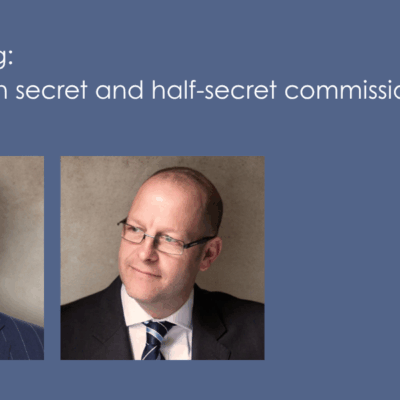Introduction
The court considered whether admissions made in an earlier witness statement could amount to admissions for the purposes of CPR 14.1, and the circumstances in which such admissions might be withdrawn pursuant to CPR 14.1(5), and PD14, paras 7.1 and 7.2.
Further, the court considered the nature of a purchaser’s and sub-purchaser’s rights under contracts for the sale of land, and the operation of the equitable doctrines of conversion and proprietary estoppel in favour of a sub-purchaser in the light of the decision of the Supreme Court in Southern Pacific Mortgages Ltd v Scott (Mortgage Business plc intervening) [2015] AC 385.
In particular, the court considered the circumstances in which a sub-purchaser might enforce the original contract against the original seller, and thereby secure performance of the sub-contract.
Background
In 1999 the Respondent entered into a contract of sale of his business, including number of properties, to a company that he controlled (NEL). The contract was completed save for the transfer of the properties to NEL which remained in his name to save stamp duty, with the contract providing that NEL could call for a transfer on giving 7 days’ notice.
In 2003 NEL agreed to sell 8 of the properties (“the Properties”) to a company belonging to an off-shore family trust (CSPL) for tax reasons. Again, the contract was completed and the purchase price was paid, save that, again, the Properties remained in the name of the Respondent as legal owner. Thereafter, the Properties were treated as an asset of CSPL in its accounts, and the rents received and expenses incurred in connection went through CSPL’s accounts.
NEL entered into liquidation in 2016, and CSPL entered into administration in 2017. The joint liquidators of NEL and the joint administrators of CSPL are the same individual insolvency practitioners.
The joint administrators of CSPL issue an application against the Respondent under ss. 234 and 236 seeking an order that he execute transfers of the Properties in favour of CSPL. In witness evidence in response, the Respondent admitted that he had held the Properties upon trust for CSPL and that CSPL had been entitled to enforce the 1999 contract, but alleged that he had entered into an agreement with the directors of CSPL in 2016 to acquire the beneficial interest in the Properties – an allegation hotly contested by the joint administrators of CSPL.
It was determined at an earlier hearing of a preliminary issue that the ss.234/236 procedure was potentially available to the joint administrators and not inappropriate.
Shortly before trial, the Respondent abandoned his case with regard to the agreement to acquire the beneficial interest in the Properties, but also sought to resile from his admission that he held the Properties upon trust for CSPL. Relying on Southern Pacific Mortgages v Scott, he argued that NEL had not acquired any proprietary rights under the 1999 contract, and so had not been able to grant any proprietary rights in favour of CSPL that the latter could enforce. On this basis, so he argued, CSPL had no right to specific performance as against the Respondent, and thus no trust in respect of the Properties could arise in favour of CSPL. Further there was no privity of contract as between the Respondent and CSPL. Thus, as the joint administrators could be in no better position CSPL, the joint administrators were not entitled to the relief that they sought.
Decision
The admissions made in the earlier witness statement were admissions falling within CPR 14.1, and applying the criteria in PD14, para 7(2), and it would not be right to allow the Respondent to withdraw his admissions that he held the Properties upon trust for CSPL and that there was a contractual relationship between CSPL and the Respondent following the entry into the 2003 contract. The joint administrators of CSPL would be prejudiced by the Respondent being allowed to withdraw his admission, not least because they would otherwise have easily obtained an assignment from NEL of the latter’s rights under the 1999 contract.
In any event, the effect of the 1999 contract being completed, apart from the transfer of the relevant properties to NEL, was to constitute the Respondent as a bare trustee of the properties the subject matter of the 1999 contract. Likewise, once the 2003 contract was completed apart from the transfer of the legal estate, NEL held on bare sub-trust for CSPL as sub-purchaser with the result that the Respondent, as original seller, could and should act on the directions of CSPL as sub- purchaser in accordance with the principle in Re Lashmar [1891] 1 Ch 258. On this basis CSPL was entitled to call for a transfer of the Properties.
Analysing it slightly different, the authorities demonstrated that a sub-purchaser would be entitled to seek specific performance as against the original seller, essentially stepping the shoes of the original buyer where both the original contract and the sub-contract were specifically enforceable – see e.g. Snell’s equity (33rd edn) 24-003 and Shaw v Foster (1872) LR 5HL 321. Whilst there may be circumstances where it was necessary for the sub-purchaser to join the original purchaser, a claim would not generally fail over the non-joinder of the intermediate party, particularly in a case such as the present where the intermediate party was in support of the claim, and the original seller and the intermediate seller were both bare trustees (because the purchase price had been paid in full).
Whilst Southern Pacific Mortgages v Scott was authority to the effect that the 1999 contract had not conferred any proprietary rights on NEL that it could pass on, this did not matter because CSPL had stepped into the shoes of NEL, and could enforce the 1999 contract.
Further, in the circumstances, given that the Respondent had arranged matters such the Properties were treated as assets belonging beneficially to CPSL (not least for tax reasons), and as not as belonging to himself or NEL, he was estopped from denying that the held the Properties for CPSL beneficially.
The joint administrators were thus entitled to the relief that they sought.




![Delivery matters: Gaster v. HMRC [2025] EWHC 328](https://threestone.law/wp-content/uploads/2024/01/Hallett_Katherine-400x400.jpg)
